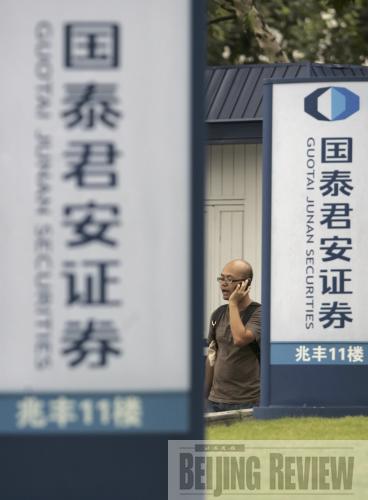|
 |
|
STORMY SEAS: Controversies over Guotai Jun'an Securities Co. Ltd. escalated to a nationwide debate over how to keep the high executive pay under control (CFP) |
Although China's economic downturn is widely believed to be fading fast, one of its side effects is now taking center stage—the escalating controversy over unreasonably high executive pay.
The news broke like lightning after it was revealed that the pre-tax compensation of Ma Mingzhe, Chairman of the Board of the Ping An Insurance (Group) Co. of China Ltd., totaled an astronomical 66 million yuan ($9.7 million) in 2008—far above the industry average. Ping An is a giant insurer headquartered in Shenzhen and is listed on both the Shanghai and Hong Kong stock exchanges.
On the heels of this controversy came a string of reports about the well-paid but poorly performing heads of state-owned enterprises—especially in the financial and real estate industries. Among the most appalling cases was that of the Shanghai-based Guotai Jun'an Securities Co. Ltd. that reportedly spent 3.2 billion yuan ($468.2 million) on executive compensation in 2008, at a time when bearish stock markets pushed the brokerage business into red ink.
Chinese enterprises used to lure and retain financial talents with lucrative pay in the millions. But now this special treatment that passed unnoticed in boom times is provoking widespread anger at companies that are rewarding poor performance. Some news media outlets are demanding regulators take a tougher stance on executive pay.
Most of the controversial top earners have avoided directly addressing the public backlash, with the notable exception of Ren Zhiqiang, President of the Hua Yuan Group, a Beijing-based real estate giant. As the highest-paid business leader among the listed property developers, Ren enjoyed a remuneration of 7.74 million yuan ($1.1 million) last year, including salary, bonuses and other benefits.
"I see nothing wrong with the high compensation for top managers," he wrote on his blog. "However much I earn, it is based on a rational incentive system that links pay to performance and is approved by our remuneration committee."
This reasoning sounds fair enough, but a deeper look at the corporate structure gives a clue to its shortcomings. In China, many high-ranking managers of the state enterprises have a large say in their remuneration committees—in turn, generating fears some may be lining their pockets rather than serving the companies.
Meanwhile, debates are heating up over whether business leaders in state-controlled sectors should be rewarded for windfalls caused by the lack of competition.
Even if the outsized pay packages are absolutely legal, they may not necessarily be reasonable, given the staggering gap between the rich and poor. According to data by the National Bureau of Statistics, the per-capita disposable income of urban residents averaged 15,781 yuan ($2,309) in 2008, with a number of poor farmers still living hand-to-mouth.
On April 9, the Ministry of Finance ordered that pay for top executives at state-owned financial companies in 2008—including salary, bonus and social insurance—should be capped under 90 percent of its level in 2007. On top of that, loss-making companies should slash another 10 percent, said the ministry.
This move was intended to enhance social fairness and push forward reforms to the country's income distribution regime, it added.
It is necessary to lessen the difference between the rich and poor, and realign the pay programs to better reflect the new economic reality that is currently unfolding, said Yi Xianrong, a senior economist at the Chinese Academy of Social Sciences.
Su Hainan, an expert at the China Association for Labor Studies, echoed Yi's opinion. "This is not just a question of fairness, but a key to corporate vitality and management efficiency," he said. "At a time of economic slowdown, extending extraordinary indulgences to senior executives surely has nothing to do with reviving a business."
The good news is that the chorus of voices calling for cuts for executive pay is finally being heeded. Whether to redeem their corporate reputation or simply to placate public anger, dozens of top business leaders have voluntarily curbed their pay or are poised to do so. Ma Mingzhe of Ping An Insurance, for one, announced he would forgo all bonuses for 2009, while Wang Shi, President of the property behemoth China Vanke Co. Ltd., pledged to give up around 4.4 million yuan ($643,745).
Simply dampening pay packages will not address the problem of how to motivate the most talented managers and deliver the best rewards for performances.
In response, the Ministry of Human Resources and Social Security is creating a more rational rewards regime covering all the state-owned enterprises. The new pay packages will be composed of three parts: base salaries, performance-based bonuses and long-term incentives. This will also factor in geographic and industrial differences, the 21st Century Business Herald reported.
Wu Shengtao, a senior manager with Deloitte Touche Tohmatsu Services Inc., Greater China Region, suggested in a report that Chinese companies should streamline their corporate structures to achieve the optimal forms of compensation.
The companies should offer a variety of incentives in return for excellent, sustained performance—such as share options and housing allowances. The pension arrangements, in particular, could help secure long-term corporate loyalty, said the report.
But the best overall guarantee of an improved incentive system, it added, is constant regulatory oversight and enforced transparency regarding pay packages. | 